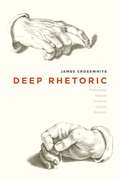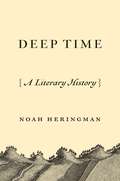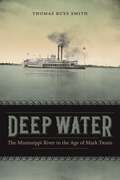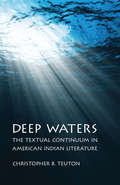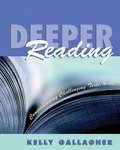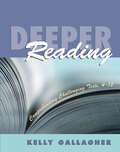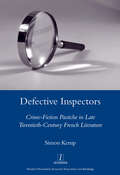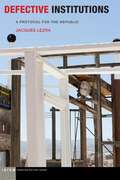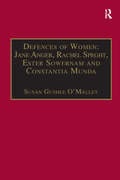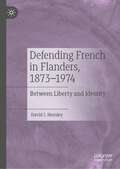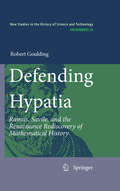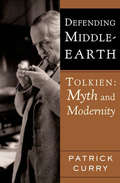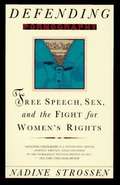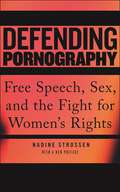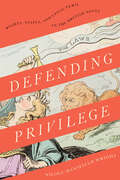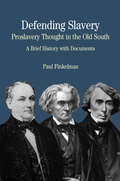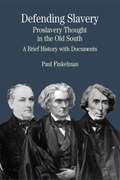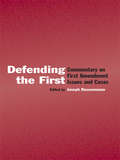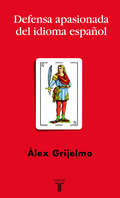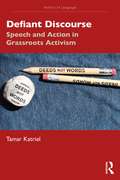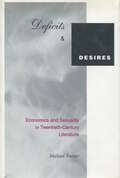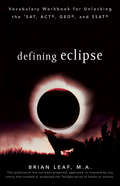- Table View
- List View
Deep Rhetoric: Philosophy, Reason, Violence, Justice, Wisdom
by James Crosswhite"Rhetoric is the counterpart of logic," claimed Aristotle. "Rhetoric is the first part of logic rightly understood," Martin Heidegger concurred. "Rhetoric is the universal form of human communication," opined Hans-Georg Gadamer. But in Deep Rhetoric, James Crosswhite offers a groundbreaking new conception of rhetoric, one that builds a definitive case for an understanding of the discipline as a philosophical enterprise beyond basic argumentation and is fully conversant with the advances of the New Rhetoric of Chaïm Perelman and Lucie Olbrechts-Tyteca. Chapter by chapter, Deep Rhetoric develops an understanding of rhetoric not only in its philosophical dimension but also as a means of guiding and conducting conflicts, achieving justice, and understanding the human condition. Along the way, Crosswhite restores the traditional dignity and importance of the discipline and illuminates the twentieth-century resurgence of rhetoric among philosophers, as well as the role that rhetoric can play in future discussions of ontology, epistemology, and ethics. At a time when the fields of philosophy and rhetoric have diverged, Crosswhite returns them to their common moorings and shows us an invigorating new way forward.
Deep Rhetoric: Philosophy, Reason, Violence, Justice, Wisdom
by James Crosswhite“Rhetoric is the counterpart of logic,” claimed Aristotle. “Rhetoric is the first part of logic rightly understood,” Martin Heidegger concurred. “Rhetoric is the universal form of human communication,” opined Hans-Georg Gadamer. But in Deep Rhetoric, James Crosswhite offers a groundbreaking new conception of rhetoric, one that builds a definitive case for an understanding of the discipline as a philosophical enterprise beyond basic argumentation and is fully conversant with the advances of the New Rhetoric of Chaïm Perelman and Lucie Olbrechts-Tyteca. Chapter by chapter, Deep Rhetoric develops an understanding of rhetoric not only in its philosophical dimension but also as a means of guiding and conducting conflicts, achieving justice, and understanding the human condition. Along the way, Crosswhite restores the traditional dignity and importance of the discipline and illuminates the twentieth-century resurgence of rhetoric among philosophers, as well as the role that rhetoric can play in future discussions of ontology, epistemology, and ethics. At a time when the fields of philosophy and rhetoric have diverged, Crosswhite returns them to their common moorings and shows us an invigorating new way forward.
Deep Time: A Literary History
by Noah HeringmanHow the concept of “deep time” began as a metaphor used by philosophers, poets, and naturalists in the eighteenth and nineteenth centuriesIn this interdisciplinary book, Noah Heringman argues that the concept of “deep time”—most often associated with geological epochs—began as a metaphorical language used by philosophers, poets, and naturalists of the eighteenth and nineteenth centuries to explore the origins of life beyond the written record. Their ideas about “the abyss of time” created a way to think about the prehistoric before it was possible to assign dates to the fossil record. Heringman, examining stories about the deep past by visionary thinkers ranging from William Blake to Charles Darwin, challenges the conventional wisdom that the idea of deep time came forth fully formed from the modern science of geology. Instead, he argues, it has a rich imaginative history.Heringman considers Johann Reinhold Forster and Georg Forster, naturalists on James Cook’s second voyage around the world, who, inspired by encounters with Pacific islanders, connected the scale of geological time to human origins and cultural evolution; Georges-Louis Leclerc, Comte de Buffon, who drew on travel narrative, antiquarian works, and his own fieldwork to lay out the first modern geological timescale; Blake and Johann Gottfried Herder, who used the language of fossils and artifacts to promote ancient ballads and “prehistoric song”; and Darwin’s exploration of the reciprocal effects of geological and human time. Deep time, Heringman shows, has figural and imaginative dimensions beyond its geological meaning.
Deep Water: The Mississippi River in the Age of Mark Twain (Southern Literary Studies)
by Thomas Ruys SmithMark Twain’s visions of the Mississippi River offer some of the most indelible images in American literature: Huck and Jim floating downstream on their raft, Tom Sawyer and friends becoming pirates on Jackson’s Island, the young Sam Clemens himself at the wheel of a steamboat. Through Twain’s iconic river books, the Mississippi has become an imagined river as much as a real one. Yet despite the central place that Twain’s river occupies in the national imaginary, until now no work has explored the shifting meaning of this crucial connection in a single volume. Thomas Ruys Smith’s Deep Water: The Mississippi River in the Age of Mark Twain is the first book to provide a comprehensive narrative account of Twain’s intimate and long-lasting creative engagement with the Mississippi. This expansive study traces two separate but richly intertwined stories of the river as America moved from the aftermath of the Civil War toward modernity. It follows Twain’s remarkable connection to the Mississippi, from his early years on the river as a steamboat pilot, through his most significant literary statements, to his final reflections on the crooked stream that wound its way through his life and imagination. Alongside Twain’s evolving relationship to the river, Deep Water details the thriving cultural life of the Mississippi in this period—from roustabouts to canoeists, from books for boys to blues songs—and highlights a diverse collection of voices each telling their own story of the river. Smith weaves together these perspectives, putting Twain and his creations in conversation with a dynamic cast of river characters who helped transform the Mississippi into a vibrant American icon.By balancing evocative cultural history with thought-provoking discussions of some of Twain’s most important and beloved works, Deep Water gives readers a new sense of both the Mississippi and the remarkable writer who made the river his own.
Deep Waters: The Textual Continuum in American Indian Literature
by Christopher B. TeutonWeaving connections between indigenous modes of oral storytelling, visual depiction, and contemporary American Indian literature, Deep Waters demonstrates the continuing relationship between traditional and contemporary Native American systems of creative representation and signification. Christopher B. Teuton begins with a study of Mesoamerican writings, Diné sand paintings, and Haudenosaunee wampum belts. He proposes a theory of how and why indigenous oral and graphic means of recording thought are interdependent, their functions and purposes determined by social, political, and cultural contexts. The center of this book examines four key works of contemporary American Indian literature by N. Scott Momaday, Gerald Vizenor, Ray A. Young Bear, and Robert J. Conley. Through a textually grounded exploration of what Teuton calls the oral impulse, the graphic impulse, and the critical impulse, we see how and why various types of contemporary Native literary production are interrelated and draw from long-standing indigenous methods of creative representation. Teuton breaks down the disabling binary of orality and literacy, offering readers a cogent, historically informed theory of indigenous textuality that allows for deeper readings of Native American cultural and literary expression.
Deepakam Prathamo Bhag class 6 - NCERT-25: दीपकम् प्रथमो भागः ६वीं कक्षा - एनसीईआरटी - २५
by Rashtriy Shaikshik Anusandhan Aur Prashikshan Parishadदीपकम् प्रथमः भागः यह पुस्तक संस्कृत भाषा के प्रारंभिक शिक्षार्थियों के लिए एक महत्वपूर्ण पाठ्यपुस्तक है, जो वर्णमाला के अध्ययन से लेकर सरल वाक्य-रचना और शब्दज्ञान तक विस्तृत अभ्यास प्रदान करती है। इसमें सबसे पहले स्वर तथा व्यंजन वर्णों का स्पष्ट वर्गीकरण और उनके उच्चारण-स्थान की जानकारी दी गई है। पुस्तक में वर्णों को उनके प्रकार जैसे कण्ठ्य, तालव्य, मूर्धन्य, दन्त्य, ओष्ठ्य आदि के आधार पर समझाया गया है। पाठों के माध्यम से व्याकरण के मूलभूत सिद्धांत जैसे संधि, संयुक्ताक्षर, लट्लकार, शब्दरूप, धातुरूप आदि का अभ्यास करवाया गया है। हर पाठ में "वयं शब्दार्थान् जानीमः", "वयम् अभ्यासं कुर्मः" और "परियोजनाकार्यम्" जैसे अनुभाग विद्यार्थियों को व्यावहारिक अभ्यास के साथ-साथ रचनात्मकता की ओर भी प्रेरित करते हैं। इसके अलावा छात्रों की पारिवारिक और सामाजिक जानकारी को भी संस्कृत में प्रस्तुत करने का अवसर दिया गया है, जैसे नाम, कुल, शिक्षकों व मित्रों के नाम लिखना आदि। कुल मिलाकर, यह पुस्तक विद्यार्थियों को संस्कृत भाषा के मूल तत्वों की समझ विकसित करने में सहायक है और उन्हें अभ्यास के माध्यम से भाषा में प्रवीणता की दिशा में मार्गदर्शन देती है।
Deepakam Sanskrit-Pathyapustakam class 8 - NCERT - 25: दीपकम् संस्कृत-पाठ्यपुस्तकम ८वीं कक्षा - एनसीईआरटी - २५
by Rashtriy Shaikshik Anusandhan Aur Prashikshan Parishad‘दीपकम्’ कक्षा ८ के लिए तैयार किया गया संस्कृत-पाठ्यपुस्तक है, जिसे राष्ट्रीय शैक्षिक अनुसंधान और प्रशिक्षण परिषद् (NCERT) ने राष्ट्रीय शिक्षा नीति 2020 तथा राष्ट्रीय पाठ्यचर्या रूपरेखा 2023 के अनुरूप विकसित किया है। इस पुस्तक में भारतीय ज्ञान परम्परा, संस्कृति और नैतिक मूल्यों का संतुलित समावेश किया गया है। इसमें बारह पाठ हैं जिनमें वेद-मन्त्र, सुभाषित, कथाएँ, कविताएँ, प्रेरणादायक प्रसंग और आधुनिक विषय जैसे ‘डिजिभारतम्’ सम्मिलित हैं। पुस्तक का उद्देश्य विद्यार्थियों में संस्कृत भाषा के श्रवण, बोलने, पढ़ने और लिखने के चारों कौशलों का विकास करना है, साथ ही शब्दावली एवं व्याकरण को संदर्भानुसार सरल और व्यावहारिक रूप में प्रस्तुत करना है। प्रत्येक पाठ के अंत में अभ्यास, परियोजना कार्य और योग्यता-विस्तार जैसी गतिविधियाँ दी गई हैं जो विश्लेषणात्मक तथा रचनात्मक सोच को प्रोत्साहित करती हैं। इस पाठ्यपुस्तक की विशेषता यह है कि इसमें छात्रों की जिज्ञासा को जाग्रत करने वाले चित्र, संवाद, परियोजनाएँ और बहुभाषीय शब्दार्थ भी जोड़े गए हैं, जिससे मातृभाषा और संस्कृत के बीच पुल बने। ‘दीपकम्’ विद्यार्थियों के सर्वांगीण विकास, जीवन मूल्यों की स्थापना, सामाजिक चेतना, राष्ट्रीय गर्व और पर्यावरणीय संवेदनशीलता को बढ़ाने में सहायक है। इस प्रकार यह पुस्तक केवल भाषा-अधिगम का साधन नहीं बल्कि आदर्श जीवन मूल्यों का दीपक भी है।
Deeper Reading: Comprehending Challenging Texts, 4-12
by Kelly GallagherBuilding on twenty years of teaching language arts, the author shows how students can be taught to successfully read a broad range of challenging and difficult texts with deeper levels of comprehension. In this book, the author shares effective, classroom-tested strategies that enable your students to: accept the challenge of reading difficult books; move beyond a "first draft" understanding of the text into deeper levels of reading; consciously monitor their comprehension as they read; employ effective fix-it strategies when their comprehension begins to falter; use meaningful collaboration to achieve deeper understanding of texts; think metaphorically to deepen their reading comprehension; reach deeper levels of reflection by understanding the relevance the book holds for themselves and their peers; use critical thinking skills to analyze real-world issues. The author also provides guidance on effective lesson planning that incorporates strategies for deeper reading.
Deeper Reading: Comprehending Challenging Texts, 4-12
by Kelly GallagherDo your students often struggle with difficult novels and other challenging texts? Do you feel that you are doing more work teaching the novel than they are reading it? Building on twenty years of teaching language arts, Kelly Gallagher shows how students can be taught to successfully read a broad range of challenging and difficult texts with deeper levels of comprehension. In Deeper Reading: Comprehending Challenging Texts, 4-12 , he shares effective, classroom-tested strategies that enable your students to: Accept the challenge of reading difficult books and move beyond a "first draft" understanding Consciously monitor their comprehension as they read and employ effective "fix-it" strategies when comprehension starts to falter Use meaningful collaboration and metaphorical thinking to achieve deeper understanding of texts Reflect on the relevance the book holds for themselves and their peers by using critical thinking skills to analyze real-world issues Gallagher also provides guidance on effective lesson planning that incorporates strategies for deeper reading. Funny, poignant, and packed with practical ideas that work in real classrooms, Deeper Reading is a valuable resource for any teacher whose students need new tools to uncover the riches found in complex texts.
Defective Inspectors: Crime-fiction Pastiche In Late Twentieth-century French Literature
by Simon KempCrime fiction is a popular target for literary pastiche in France. From the nouveau roman and the Oulipo group to the current avant-garde, writers have seized on the genre to exploit it for their own ends, toying with its traditional plots and characters, and exploring its preoccupations with perception, reason and truth. In the first full-length study of the phenomenon, Simon Kemp's investigation centres on four major writers of the twentieth century, Alain Robbe-Grillet (b. 1922), Michel Butor (b. 1926), Georges Perec (193682) and Jean Echenoz (b. 1947). Out of their varied encounters with the genre, from deconstruction of the classic detective story to homage to the roman noir, Kemp elucidates the complex relationship between the pasticheur and his target, which demands an entirely new assessment of pastiche as a literary form.
Defective Institutions: A Protocol for the Republic (Idiom: Inventing Writing Theory)
by Jacques LezraDefective Institutions overturns the basis of institutionalism. Faith in classic institutions—exposed as clamorously inadequate by the failure of governance under neoliberalism--does not result in greater democracy, greater horizontality, or more equitable living. Nor does trust in the standing of decisions, in the authority of antecedent cases, in the coherence, strength, continuity, or solidity of the institutions that frame and render legitimate these decisions and the rules they buttress. To the contrary: the classically-imagined institution and our faith in it lie at the heart of neoliberal unfreedom and racialized violence.Working at the point of contact and conflict between socialist and anarcho-philosophical traditions, Defective Institutions offers an alternative, which is also an alternative to the figures of governance associated with the liberal conception of the state: an aberrant republicanism comprised of defective institutions, run through with the necessity of their abolition. Lezra’s book moves from the primitive scenes of Western political institution—the city; the family; the university; the first person; “race”—through recent work in the philosophy of translation, decolonial studies, abolitionism, Afropessimism and its critiques, psvchoanalysis, and musicology.To offer an original wedding of abolition and institution, Lezra brings together genealogies of contemporary institutionalism (from Durkheim and Hauriou to Searle); post-Marxist accounts of the state (Balibar, Abensour); philosophical and anthropological anarchism (Wolff, Malabou, Graeber, Scott); critical legal theory (analyses of Marbury v. Madison as well as Dobbs v. Jackson); continental and analytic versions and critiques of foundationalism (Heidegger, Lyotard and Butler; Quine, Searle and Fine); and political and sociological abolitionism (Lewis, O’Brien). At a time when some call for strengthening institutions and for defending liberties ostensibly protected by such institutions, and others long for the destruction of institutions that have long been oppressive, Lezra’s book offers today’s Left a new framework for confronting institutions’ necessity and their necessary abolition.
Defences of Women: Printed Writings 1500-1640: Series 1, Part One, Volume 4 (The Early Modern Englishwoman: A Facsimile Library of Essential Works & Printed Writings, 1500-1640: Series I, Part One)
by Susan Gushee O'MalleyJane Anger her Protection for Women A Mouzell for Melastomus Ester hath hang’d Haman The Worming of a mad Dogge Of the many tracts in defence of women published in early modern England only these four bear women’s names. All four were written in response to misogynist attacks. Of these writers, only Speght (1597-c.1630) is historically identifiable. Two or possibly three of the others use pseudonyms and indeed their gender has not yet been definitely established.
Defending French in Flanders, 1873–1974: Between Liberty and Identity
by David J. HensleyThis book examines the efforts of the French-speaking minority in Flanders, Belgium, to maintain a legal and social presence of the French language in Flemish public life. Chronologically, the study is bookended by two developments, almost exactly a century apart. In 1873, the first laws were passed which required the use of Dutch in some aspects of public administration in Flanders, challenging the de facto use of French among the Flemish ruling class. One hundred and one years later, the last French daily newspaper in Flanders collapsed, marking the end of a once-vibrant French-language public sphere in Flanders. The author contends that the methods and arguments by which French speakers defended the role of French in Flemish public life changed along with the social and political situation of this minority. As the Flemish movement grew over the course of the twentieth century, French speakers’ appeals to the “free choice” of language lost traction, and they put forward claims that they represented an ethnolinguistic minority who deserved protection for their mother tongue. Providing new insights for scholars of European history, and in conversation with the literature on liberalism, national identity, and Francophonie, this book demonstrates how the debate over the role of French in Flanders was at the center of Belgium’s ethnolinguistic conflict – the repercussions of which continue to be felt to this day.
Defending Hypatia
by Robert GouldingWhy should mathematics, the purest of sciences, have a history? Medieval mathematicians took little interest in the history of their discipline. Yet in the Renaissance the history of mathematics flourished. This book explores how Renaissance scholars recovered and reconstructed the origins of mathematics by tracing its invention in prehistoric Antiquity, its development by the Greeks, and its transmission to modern Europe via the works of Euclid, Theon and Proclus. The principal architects of this story -- the French philosopher and University of Paris reformer Peter Ramus, and his critic, the young Oxford astronomy lecturer Henry Savile - worked out diametrically opposed models for the development of the mathematical arts, models of historical progress and decline which mirrored each scholar's larger convictions about the nature of mathematical thinking, the purpose of the modern university, and the potential of the human mind. In their hands, the obscure story of mathematical history became a site of contention over some of the most pressing philosophical and pedagogical debates of the sixteenth century.
Defending Middle-Earth: Tolkien: Myth and Modernity
by Patrick CurryA scholar explores the ideas within The Lord of the Rings and the world created by J. R. R. Tolkien: &“A most valuable and timely book&” (Ursula K. Le Guin, Los Angeles Times–bestselling author of Changing Planes). What are millions of readers all over the world getting out of reading the Lord of the Rings trilogy? Defending Middle-earth argues, in part, that the appeal for fans goes far deeper than just quests and magic rings and hobbits. In fact, through this epic, Tolkien found a way to provide something close to spirit in a secular age. This thoughtful book focuses on three main aspects of Tolkien&’s fiction: the social and political structure of Middle-earth and how the varying cultures within it find common cause in the face of a shared threat; the nature and ecology of Middle-earth and how what we think of as the natural world joins the battle against mindless, mechanized destruction; and the spirituality and ethics of Middle-earth—for which the author provides a particularly insightful and resonant examination. Includes a new afterword
Defending Pornography: Free Speech, Sex, and the Fight for Women's Rights
by Nadine StrossenTraditional explanations of why pornography must be defended from would-be censors have concentrated on censorship's adverse impacts on free speech and sexual autonomy. In contrast, Nadine Strossen focuses on the women's rights-centered rationale for defending pornography.
Defending Pornography: Free Speech, Sex, and the Fight for Women's Rights
by Nadine StrossenA new edition of a groundbreaking, feminist defense of pornography as free speechNamed a Notable Book by The New York Times Book Review in 1995, Defending Pornography examines a key question that has divided feminists for decades: is censoring pornography good or bad for women? Nadine Strossen makes a powerful case that increasing government power to censor sexual expression, beyond the limits that the First Amendment sensibly permits (for example, outlawing child pornography) would do more harm than good for women and others who have traditionally been marginalized due to sex or gender, She explains how the very anti-porn laws pushed by some feminists have led to the censorship of LGBTQ+ and feminist works, and she examines the startling connections between anti-porn feminists and right-wing fundamentalists. In an illuminating new Preface, Strossen lays out the multiple current assaults on sexual expression, which continue to come from across the ideological spectrum. She shows that freedom for such expression remains an essential prerequisite for the equality, safety, and dignity of women and sexual/gender minorities.
Defending Privilege: Rights, Status, and Legal Peril in the British Novel
by Nicole Mansfield WrightA critique of attempts by conservative eighteenth- and nineteenth-century authors to appropriate the rhetoric of victimhood and appeals to "rights" to safeguard the status of the powerful.As revolution and popular unrest roiled the final decades of the eighteenth century, authors, activists, and philosophers across the British Empire hailed the rise of the liberal subject, valorizing the humanity of the marginalized and the rights of members of groups long considered inferior or subhuman. Yet at the same time, a group of conservative authors mounted a reactionary attempt to cultivate sympathy for the privileged. In Defending Privilege, Nicole Mansfield Wright examines works by Tobias Smollett, Charlotte Smith, Walter Scott, and others to show how conservatives used the rhetoric of victimhood in attempts to convince ordinary readers to regard a privileged person's loss of legal agency as a catastrophe greater than the calamities and legally sanctioned exclusion suffered by the poor and the enslaved. In promoting their agenda, these authors resuscitated literary modes regarded at the time as derivative or passé—including romance, the gothic, and epistolarity—or invented subgenres that are neglected today due to widespread revilement of their politics (the proslavery novel).Although these authors are not typically considered alongside one another in scholarship, they are united by their firsthand experience of legal conflict: each felt that their privilege was degraded through lengthy disputes. In examining the work of these eighteenth- and early nineteenth-century authors, Wright traces a broader reactionary framework in the Anglophone literary legacy. Each novel seeks to reshape and manipulate public perceptions of who merits legal agency: the right to initiate a lawsuit, serve as a witness, seek counsel from a lawyer, and take other legal actions. As a result, Defending Privilege offers a counterhistory to scholarship on the novel's capacity to motivate the promulgation of human rights and champion social ascendance through the upwardly mobile realist character.
Defending Slavery: A Brief History With Documents
by Paul FinkelmanHow the American South attempted to justify the violation of human rights.
Defending Slavery: Proslavery Thought in the Old South, A Brief History with Documents
by Paul FinkelmanWithin decades of the American Revolution, the Northern states had either ended slavery or provided for its gradual abolition. Slavery, however, was entrenched in the South and remained integral to American politics and culture. Nationally, it was protected by the U.S. Constitution, federal laws, and Supreme Court decisions, and slaveowners dominated all three branches of the federal government. From the time of the Revolution until the Civil War (and beyond), Southern thinkers offered a variety of proslavery arguments. This body of thought—based on religion, politics and law, economics, history, philosophy, expediency, and science—offers invaluable insights into how slavery shaped American history and continues to affect American society. In this volume, Paul Finkelman presents a representative selection of proslavery thought and includes an introduction that explores the history of slavery and the debate over it. His headnotes supply a rich context for each reading. The volume also includes a chronology, a selected bibliography, and illustrations.
Defending the First: Commentary on First Amendment Issues and Cases (Routledge Communication Series)
by Joseph RussomannoDefending the First provides a collection of new perspectives on the First Amendment in legal and communication contexts. Editor Joseph Russomanno brings together a roster of major figures who have participated in the shaping of First Amendment law over the past 30 years. Readers are taken into a realm of personal experience and analysis through the stories of these attorneys at the forefront of the battle to defend the "First." The contributors to this volume--all of whom have argued cases before the Supreme Court--tell about their experiences appearing before the highest court in the United States. Some write many years after being there, while others offer insights from a more recent vantage point. One Supreme Court Attorney offers a historical analysis of a case replete with a variety of First Amendment issues.This work contributes to a deeper understanding of First Amendment issues and the types of expression that the First Amendment protects, and why these rights must be protected. In addition, it provides readers with the unique perspective of those who have been on the front lines of some of the most important and influential cases in this era. The challenges of presenting an argument in this venue become clear, and it is evident that understanding one's own case, its lineage, and its likely impact all become part of the formula for success.This distinctive collection provides personal and compelling insights into the making of communication law, and it will be engaging reading for students in communication law courses. It will also appeal to any reader interested in First Amendment law.
Defensa apasionada del idioma español
by Álex GrijelmoUna reivindicación del español, pero no a costa de otras lenguas sino en diálogo enriquecedor con todas ellas. El lector encontrará aquí una defensa. Nunca un ataque. El idioma español se ve rodeado ahora por los problemas en la educación escolar de sus hablantes, y por la fuerza colonial del inglés, y por la desidia de una gran parte de quienes tienen el poder político, informativo y económico en los veintiún países que asumen esta legua como propia. Nuestro idioma habrá de dar -sólo si empezamos a ser conscientes de los peligros que lo acechan- con los resortes adecuados para salir de esta situación que genera poco a poco un inmenso complejo de inferioridad de todo el mundo hispano frente al poderoso hombre anglosajón. Pero el progreso que aquí se plantea para la lengua española nunca deberá producirse a costa del catalán, del euskera, el gallego, el bable, el altoaragonés, el quechua, el araucano, el náhuatl, el mayo o yucateco, el otomí, el aimara, el guaraní, el quiché, el chaquiquel, el tarahumara... Ni siquiera a costa del inglés o del francés. Todas las lenguas atesoran un genio enterno que guarda las esencias de los pueblos que las hablan y las han hablado; jamás una lengua se debe utilizar contra otra. Con cada palabra que desaparece se pierde una idea crada por el ser humano.
Defiant Discourse: Speech and Action in Grassroots Activism
by Tamar KatrielIn this timely and innovative book, Tamar Katriel takes a language and discourse-centred approach to the subject of peace activism in Israel-Palestine, one of the most significant political issues of our time, while also posing more general questions about the role played by language in activist movements – how activists themselves conceptualize their speech and its relationship to action. Viewing activism as a globalized cultural formation that gives shape and meaning to grassroots organizations' struggles for political change, this book explores the relations between the cultural categories of speech and action as constructed and evaluated in activist contexts. It focuses on the specific empirical field of defiant discourse associated with the soldierly role in Israeli culture, using it to offer an in-depth exploration of the cultural underpinnings of defiant speech. Katriel interrogates discourse-centered activism as part of social movements' action repertoires on the one hand, and of the local cultural construction of speech cultures on the other. This is critical reading for all students and scholars studying activism and social movements within linguistics, Middle Eastern studies, peace studies, and communication studies.
Deficits and Desires: Economics and Sexuality in Twentieth-Century Literature
by Michael TratnerThis book examines the effects on literary works of a little-noted economic development in the early twentieth century: individuals and governments alike began to regard going into debt as a normal and even valuable part of life. The author also shows, surprisingly, that the economic changes normalizing debt paralleled and intersected with changes in sexual discourse. In Victorian novels, sex and debt are considered dangerous activities that the young should avoid in order to save and invest toward eventual marriage and a home. In twentieth-century texts, however, it often seems acceptable to go into debt and engage in sex before marriage. These literary representations followed social transformations as both economic and sexual discourse moved from the logic of saving and production to the logic of circulation. In Keynesian economics and consumerism, governments and individuals were actually encouraged to borrow and to spend more in order to increase demand and keep money circulating. In twentieth-century sexual treatises, people were similarly encouraged to indulge their desires, as pent-up states were considered as deleterious to the physical body as they were to the economic. In this book, the author traces these social transformations by examining twentieth-century literary works and films that are structured around contrasts between repressive and expansive forms of economics and sexuality. He studies a range of authors, including James Joyce, F. Scott Fitzgerald, Virginia Woolf, Ezra Pound, Zora Neale Hurston, and Frank Capra. The book ends with the 1960s, because after that decade deficits no longer seemed the cure for anything, and the advocacy of sexual indulgence dwindled. For half a century, however, the intersections of sexual and economic discourses created a sense that society was on the verge of a vast transformation. The artists studied in this book were fascinated by such a prospect, but remained ambivalent, as it seemed that their dreams of escaping dull bourgeois life and ending repression were becoming true because of the influence of the crassest economic policies.
Defining Eclipse: Vocabulary Workbook For Unlocking The Sat, Act, Ged, And Ssat
by Brian LeafThe most captivating way to master vocabulary for the SAT, ACT, GED, and SSAT examsJoin Bella, Jacob, and Edward as you learn more than 600 vocabulary words for the SAT, ACT, GED, and SSAT! With hundreds of new vocabulary words, this book can be used completely on its own or as a follow-up to DefiningTwilight and Defining New Moon.You'll use this vocabulary workbook side-by-side with your own copy of Stephenie Meyer's Eclipse. Each chapter of the workbook gives you eight words taken from Eclipse, with page references for you to read the words in the context of your favorite novel. Once you have a grip on the words and their meanings, you'll take SAT, ACT, GED, and SSAT drills to test and integrate your new vocabulary skills. Improve your vocabulary skills to get into the college of your dreamsLearn synonyms and memorization toolsOther best-selling titles by Brian Leaf: Defining Twilight and Defining New MoonWhether you're on Team Edward or Team Jacob, any fan of the Twilight saga can turn to Defining Eclipse to master vocabulary for the SAT, ACT, GED, and SSAT exams.
